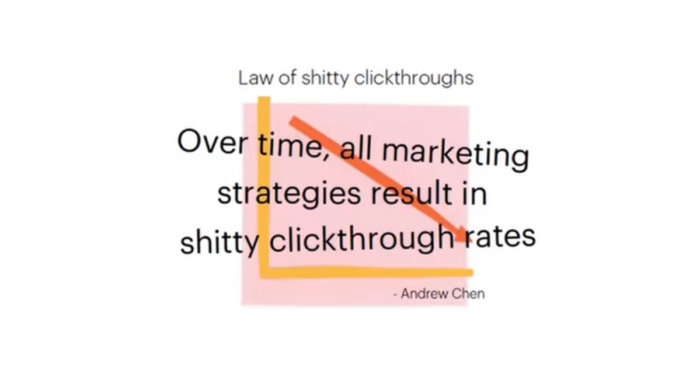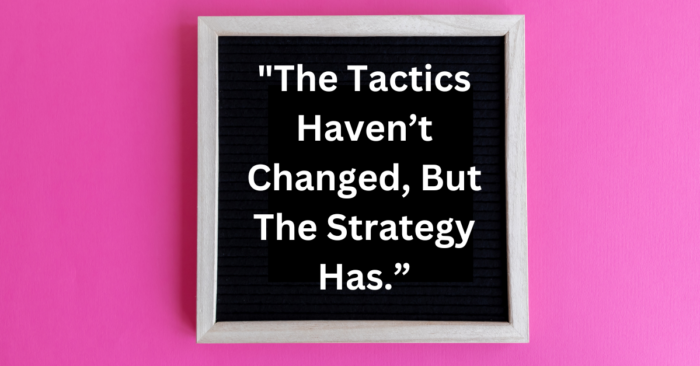Fair warning. You are going to be hearing a lot from me around the impact of AI on SEO. Get excited.
Because as marketers, it’s important we keep up slowly but surely to understand how this is going to change what we do as far as what SEO, and all the things that come along with it, entail: improving brand awareness, visibility, competitiveness, relevance….and of course, clicks, traffic, conversions, leads, sales and revenue.
Not talking about the impact of AI on SEO and carrying about our SEO business as usual is silly. It’s ignoring the elephant in the room. Because this potentially changes each aspect, small and big, positive and negative, from improved efficiency in our daily work to the loss of jobs in our field. And the earlier we can accept, absorb, and incorporate this into our strategies, the better. SEO business is not going to be what it once was.

As the great Cyrus Shepard, an SEO industry titan, tweeted a few weeks ago, The Golden Age of Google SEO is over. And it’s actually been declining for awhile.
**Note that I didn’t say the Golden Age of “SEO” Is over. I said “Google SEO.” SEO, and what it represents, has a long shelf life, and it’s far from being over.
“It’s Complicated.” Where Google SEO Was Then, and Where It Is Now
Over the years, when I would try to explain what I did as an SEO Consultant to non-industry people, the simplest thing I could think of to say was “I help businesses get to the top of Google.”
However, over the past few years, “the top of Google” has ceased to become the panacea it used to be.
Here’s why:
- Paid ads moved from the sidebar to the top of Google, claiming a gigantic spot of important real estate that used to go towards organic listing and clicks
- The SERPS (search engines results pages) started changing dramatically and diversifying, including images, map results and local listings, video snippets, news stories, and more. The concept of “10 little blue links” became part of the distant past.
- Google became a source of information for research-hungry visitors, not just a destination where the objective was to visit a website. A frequently quoted SEO study claimed 80% of the searches on Google were informational, not transactional. That meant more browsing, less buying.
- We consumers became tired of clicking on websites that were generic, boring, slow, spammy, full of ads, full of pop-ups, and long-winded. Google recognized that and acted accordingly, which means it was less incentivized to send traffic to sites.
- A growing number of fed-up searchers who desire authentic, human, and useful results (not listsicles) have been adding “reddit” to the end of their search query to pull up reddit pages versus Google results.
- And the most significant thing that began impacting and changing SEO, is when Google rolled out PAAs (People Also Ask) and began answering questions directly on Google (aka zero click searches), eliminating the need for a visitor to click on a website.
Boom.
I stopped being able to say that what I did was “get companies to the top of Google,” because that no longer represented the realistic world of SEO.
Organic listings, even though they were still “technically” ranking well, were pushed down to the bottom of the page below ads, below map listings, below PAAs, below Google shopping carousels ads, and below instant answers. And CTRs (clickthrough rates), dropped.

Now — Did This Mean We Needed to Give Up on Organic SEO? Not So Much.
What it did mean is that we as an industry and profession needed to educate, and reset expectations with our clients and companies. The forward-thinking customers and companies got it. They adjusted.
Many who had unrealistic expectations or who fought change, didn’t. And instead decided to pour money into ads. Many of my SEO colleagues have decided that organic SEO is no longer worth it and have branched off to other areas. (Sad, but I get it). Now, ad performance is no longer what it used to be either. David Shapiro, an amazing speaker I saw at a conference recently, shared this quote and law by Andrew Chen:

And thus, the decline of the Golden Age of Google SEO was expedited by AI, but has been happening slowly over the years. And in some ways, has eased us into preparing for a life of AI baked into Google and Bing (AKA what Google calls “Generative Search Experience” and Bing has called – wait for it – the New Bing).
Social SEO, Generative AI, and Where We Are Now
One more big trend has prepared us for a shift away from Google as the end-all-be-all of organic SEO. That over the years, social media sites increasingly became used as search engines. I talked a lot about this in 2015. This trend was amplified even more during COVID. Pinterest use, for example, exploded.
It’s a fact the younger generation prefers to search on TikTok and Instagram for information. Almost 40% of Gen Z, and growing. They don’t go to Google to search for trends, shopping, travel, advice, etc. as many of us older folks do.
So where does that leave us now?
Here’s the thing. People still search. As long as a website, platform, or tool has a search bar, people are going to use keywords. Getting found is still a thing, even if it is more diversified and not happening on Google exclusively.
And when consumers, and our B2B prospects, are in the buying phase of wanting and needing to click on websites, you still better show up prominently for those keywords, phrases, and topics aligned to your business.
There are so many things to say about this, which is my focus for next time.
At a recent SEO event I attended, one of the speakers was spot on with this insight: “The tactics haven’t changed, but the strategy has.”
I can’t wait to dive into that soon. Until then!

